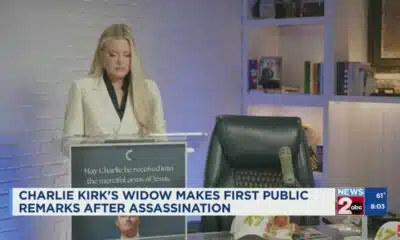News from the South - Missouri News Feed
Before doling out subsidies, Missouri should insist John Sherman and Clark Hunt testify
by Patrick Tuohey, Missouri Independent
June 2, 2025
As the Missouri legislature begins its special session to consider, among other things, taxpayer subsidies for the Kansas City Chiefs and Royals, lawmakers are hearing from a parade of stakeholders — Gov. Mike Kehoe, policy analysts, lobbyists, activists and the many special interests who stand to gain from the deal.
They should also hear from the two individuals who stand to benefit most: Royals owner John Sherman and Chiefs owner Clark Hunt. These men should appear before the Missouri House and Senate to explain why taxpayer subsidies of this scale are justified. Anything less short-circuits public accountability.
During a March 2024 debate ahead of the Jackson County vote on funding a new downtown stadium, I was asked if I’d ever met Sherman. I hadn’t, though KCPBS invited Sherman to participate. His office declined every offered date.
On April 2, Jackson County voters rejected the stadium-tax extension by a decisive 58% to 42%. Their position was clear: no blank checks, no vague promises. If legislators now move forward with a $300 million bond package without in-person testimony from the owners, they risk replicating the same lack of transparency voters already rejected.
The current proposal would authorize hundreds of millions in public bonds, yet these franchises are far from lacking resources. Forbes values the Chiefs at $4.85 billion and the Royals at $1.3 billion. When billion-dollar teams request public subsidies, their owners should answer for the proposal, in person.
Key facts remain unknown: where the Royals would build, what share of costs the teams would cover, and how much the Royals would spend on the stadium itself versus adjacent commercial ventures. As in Jackson County, taxpayers are being asked to commit before the teams do. That sequence—public commitment before private investment — betrays the principles of responsible budgeting.
Until these facts are disclosed on the record, the proposal’s benefits remain impossible to assess.
Kehoe has cited the teams’ economic impact to justify the session. his justification is a familiar one — and often misleading. A 2017 report from the Federal Reserve Bank of St. Louis brief warned that many stadium impact studies “fail to include opportunity costs,” noting that spending inside an arena often displaces spending elsewhere in the local economy.
Bipartisan resistance building against Missouri governor’s stadium funding plan
That displaced spending often supports a wider variety of small businesses and contributes more reliably to public revenue through sales, property, and income taxes. By contrast, revenue from stadium-centric development tends to concentrate in the hands of franchise owners.
Kehoe also cited claims from the Royals projecting 8,400 jobs, $400 million in annual labor income, and $1.2 billion in economic output. These numbers were distributed to lawmakers just before the regular session ended. They lack independent review and should be treated accordingly.
These Missouri figures also echo broader trends. Independent research shows stadium subsidies rarely yield significant economic gains. In Nevada, legislators approved $750 million in public funds for the Raiders in 2016. Clark County now estimates total public costs ballooned to $1.35 billion—nearly double the original allocation. In New York, the new Bills stadium is projected to cost taxpayers more than $1.1 billion. Missouri lawmakers should hear why this case will be different.
A 2023 study published by the Association for Public Policy Analysis and Management explains why so many of these projections fall short. The authors—John Bradbury, Dennis Coates and Brad Humphreys—found that reports sponsored by teams or developers often use inflated multipliers, unrealistic assumptions, and conflate gross and net impacts.
Missouri senators should examine how the Royals’ numbers were generated—and how they remain so precise without a confirmed stadium site.
There is clear precedent for having owners testify. In 1997, Twins owner Carl Pohlad testified before a joint Minnesota House–Senate panel to press for a cigarette-tax-backed ballpark package. Vikings owner Zygi Wilf followed suit in 2006, fielding committee questions on the state-county deal that became U.S. Bank Stadium. And in 2016, Raiders owner Mark Davis appeared in Carson City to urge Nevada lawmakers to approve a $750 million hotel-tax subsidy for Allegiant Stadium—a commitment that will cost Clark County about $1.1 billion with interest over 30 years. Missouri can—and should—demand the same level of transparency and accountability.
Bradbury and colleagues put it plainly: “Professional sports venues generate limited economic and social benefits, which fall far short of the large public subsidies they typically receive.” These deals often amount to transfers of public wealth to private entities.
Redirecting even a portion of this investment to infrastructure, education, or health would likely yield more durable benefits for Missouri families.
Let’s not forget that merely considering these subsidies is a financial burden. The costs of convening a special session are real. The Jackson County election, demanded by the teams, cost local taxpayers roughly $1 million.
Before approving any subsidy, senators should secure clear, on-the-record answers:
- What is the private-capital commitment, in dollars?
- Who is responsible for covering overruns?
- What is the expected net new revenue, after substitution effects?
- What milestones—site control, zoning, environmental review—must precede bond issuance?
- Are there claw-back or profit-sharing provisions if forecasts fall short?
- What is the long-term plan for demolition or reuse once the stadium reaches end-of-life?
It is not unreasonable to expect Sherman and Hunt to explain their request for public funds in person. If the governor can meet with them behind closed doors, the House and Senate—and the public—deserve that same access, in open session.
Missouri Independent is part of States Newsroom, a nonprofit news network supported by grants and a coalition of donors as a 501c(3) public charity. Missouri Independent maintains editorial independence. Contact Editor Jason Hancock for questions: info@missouriindependent.com.
The post Before doling out subsidies, Missouri should insist John Sherman and Clark Hunt testify appeared first on missouriindependent.com
Note: The following A.I. based commentary is not part of the original article, reproduced above, but is offered in the hopes that it will promote greater media literacy and critical thinking, by making any potential bias more visible to the reader –Staff Editor.
Political Bias Rating: Center-Left
This content advocates for increased transparency and accountability regarding public subsidies for professional sports stadiums, emphasizing skepticism toward the use of taxpayer money for wealthy franchise owners. It highlights concerns about responsible budgeting, economic impact overstated by teams, and the public interest versus private gain, positions more commonly found among Center-Left perspectives prioritizing government oversight and public welfare. The critique is measured and focused on fiscal responsibility and stakeholder input rather than ideological opposition to business or sports, positioning it in a moderate leaning rather than strongly partisan stance.
News from the South - Missouri News Feed
Watch out for 'fly-by-night' contractors
SUMMARY: September is National Preparedness Month, reminding consumers to be cautious of “fly-by-night” contractors who often appear after storms, offering quick repairs for cash upfront but delivering poor or no work. These scammers frequently follow storms into new towns, promising great deals and falsely claiming local connections. The Better Business Bureau advises researching reliable contractors before disasters strike, as post-disaster urgency makes it easy to fall victim. Consumers should also review their insurance coverage to ensure proper protection. Resources like BBB and Ready.gov offer guides for preparedness, helping individuals plan ahead to avoid scams and make informed decisions during stressful times.
More information: BBB.org
News from the South - Missouri News Feed
Adam Wainwright’s odd story around the 9/11 attacks
SUMMARY: Before debuting with the St. Louis Cardinals, Adam Wainwright had a close brush with the Sept. 11, 2001 attacks. In early September 2001, Wainwright and his brother Trey planned a trip to New York City, initially to see a Yankees game that was rained out. Instead, they visited the Empire State Building on Sept. 10, capturing a photo with the World Trade Center behind them. They planned to visit the Baseball Hall of Fame on Sept. 11 but left New York early, narrowly avoiding the attacks. Wainwright later reflected on seeing smoke from the tragedy during their drive. He pitched for the Cardinals from 2005-2023, winning 200 games.
Read the full article
The post Adam Wainwright's odd story around the 9/11 attacks appeared first on fox2now.com
News from the South - Missouri News Feed
Charlie Kirk shooting: Weapon recovered in woods near Utah college campus, FBI says
SUMMARY: Charlie Kirk, conservative influencer and Turning Point USA co-founder, was fatally shot at Utah Valley University while speaking at an event. The FBI and Utah Department of Public Safety have not apprehended the suspect but tracked their movements before and after the shooting, including footage from the event and nearby doorbell cameras. The suspect, described as college-aged and blending with the crowd, allegedly shot Kirk from a distant rooftop using a high-powered bolt-action rifle, later abandoned in a wooded area. Authorities recovered physical evidence and urged the public to submit video footage. Two detained individuals were released, and the investigation continues.
The post Charlie Kirk shooting: Weapon recovered in woods near Utah college campus, FBI says appeared first on www.ozarksfirst.com
-
News from the South - North Carolina News Feed7 days ago
Reagan era credit pumps billions into North Carolina housing | North Carolina
-
News from the South - Alabama News Feed7 days ago
Amid opposition to Blount County medical waste facility, a mysterious Facebook page weighs in
-
News from the South - South Carolina News Feed7 days ago
South Carolina’s Tess Ferm Wins Miss America’s Teen 2026
-
News from the South - Kentucky News Feed7 days ago
3 states push to put the Ten Commandments back in school – banking on new guidance at the Supreme Court
-
Local News7 days ago
Duke University pilot project examining pros and cons of using artificial intelligence in college
-
News from the South - Missouri News Feed5 days ago
1587 Prime gives first look at food, cocktail menu ahead of grand opening in KC
-
News from the South - West Virginia News Feed6 days ago
Protesters in D.C. flood the streets demanding an end to Trump’s military deployment
-
News from the South - Virginia News Feed6 days ago
On the record: Winsome Earle-Sears












































